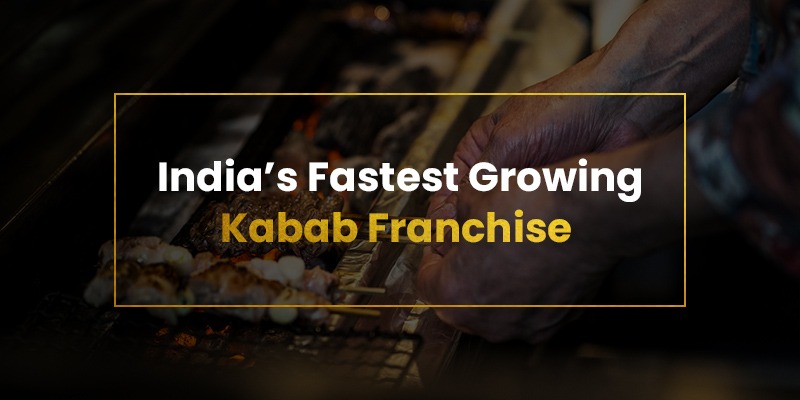India’s food industry is witnessing an exceptional rise in speciality outlets, and one segment grabbing the spotlight is the kabab franchise market. With growing consumer appetite for authentic flavours, brands like Kaka’s Kabab Franchise are redefining how grilled delicacies are served while giving entrepreneurs an opportunity to own a kabab franchise with outstanding growth potential.
A Trend Fuelled by India’s Love for Flavour
The demand for kababs isn’t new, but the scale at which it’s growing is remarkable. Urban food lovers are seeking quality, hygiene, and convenience, pushing the demand for professionally run kabab franchises in India that offer a consistent, satisfying experience across locations.
What Makes Kaka’s Kabab a Franchise Favorite?
Kaka’s Kabab Franchise blends authentic recipes with modern business systems. From standardised marinades to professional staff training, every detail ensures consistent taste and quality. With a proven model, franchise owners gain the tools to operate smoothly, delight customers, and achieve lasting profitability.
How Kabab Lovers Become Repeat Buyers?
A perfectly cooked kabab creates unforgettable taste, bringing customers back for more. The franchise model leverages this loyalty through diverse menus, seasonal specials, and affordable pricing. This repeat demand ensures consistent footfall and reliable revenue, making kabab outlets under the brand a sustainable and profitable business opportunity
Accessible Entry for Aspiring Entrepreneurs
One reason behind the rapid expansion is the brand’s accessible investment model. Compared to other food formats, the initial cost to own a kabab franchise with Kaka’s is relatively lower, making it possible for first-time business owners to enter the market with confidence.
Locations That Work in Both Small and Large Cities
The concept suits well in metropolitan areas, tier-two cities, and even tourist destinations. Since the product has universal appeal, a kabab franchise in India can succeed in busy commercial areas, near colleges, or at highway food courts, maximising visibility and footfall.
High ROI Through a Streamlined Model
The high ROI kabab franchise promise comes from efficient operations, limited wastage, and strong supplier networks. The business model focuses on fast service and manageable inventory, allowing franchise owners to recover investments faster while maintaining quality standards.
Training and Support That Build Confidence
Kaka’s provides hands-on training in food preparation, hygiene, and sales techniques. Ongoing support includes marketing campaigns, menu updates, and operational guidance, giving even newcomers to the food industry the tools to run their outlet successfully.
The Menu That Keeps Customers Coming Back
From smoky seekh kababs to tender chicken malai variants, the menu balances traditional favourites with occasional innovative additions. Pairing these with sides and beverages makes it a complete meal solution, helping franchisees increase average order value.
Leveraging Local Tastes for Greater Reach
While the core recipes remain the same, slight adjustments are made to cater to regional tastes. This adaptability ensures that whether in North India or the coastal South, the franchise remains appealing and relevant to local customers.
Marketing That Speaks the Language of Food Lovers
Kaka’s invests in both digital and on-ground marketing. Social media promotions highlight irresistible visuals, while local advertising ensures the outlet becomes a familiar name. This dual approach boosts both initial curiosity and long-term brand recall.
Expanding Through Smart Partnerships
Strategic tie-ups with delivery platforms, event caterers, and corporate cafeterias help franchise owners reach customers beyond walk-ins. This multi-channel revenue approach adds stability to the business, even during seasonal fluctuations.
Sustainability in the Food Business
The franchise also focuses on sustainable practices like sourcing ingredients locally and using eco-friendly packaging where possible. This not only reduces costs but also resonates with today’s environmentally conscious diners.
What Sets Kaka’s Growth Pace Apart?
The rapid rise is not only about taste but also about predictable profits, structured training, and a model that is easy to scale. This combination makes Kaka’s one of the most sought-after kabab franchise opportunities in India.
Why Entrepreneurs Turn to Abtta GTM?
Across all models, Abtta GTM supplies market insights, location planning, manpower training, distribution, and profitability guidance—especially in Tier 2 and Tier 3 cities. Our consultants provide full-spectrum support, helping franchisees launch and grow sustainably.
Beyond kababs, Abtta connects investors to diverse opportunities such as Karim’s for Mughlai cuisine, Bombay Brasserie for premium dining, Moti Mahal Delux for heritage North Indian flavours, Nainital Momos for regional street food favourites, CIPACA for healthcare partnerships, and Mohanlal Sons for fashion retail—offering franchise models to suit varied budgets and market segments.
FAQ’S
Q1. What is the investment required for a Kaka’s Kabab franchise?
The investment is comparatively lower than most food franchises, making it accessible for first-time entrepreneurs. Costs cover interiors, equipment, initial stock, and franchise fees.
Q2. How profitable is the Kaka’s Kabab franchise model?
With efficient operations, reduced wastage, and strong consumer loyalty, franchisees typically achieve a faster ROI compared to other food outlets.
Q3. Can the franchise work in smaller towns?
Yes, Kaka’s Kabab franchise is designed to thrive in metros, tier-two and tier-three cities, as well as tourist areas and highways.
Q4. Does Kaka’s provide training and ongoing support?
Yes, the brand offers hands-on training in food preparation, hygiene, and customer service, along with marketing and operational support post-launch.
Q5. How can I apply for a Kaka’s Kabab franchise through Abtta GTM?
Applications can be made via Abtta GTM, the official franchise partner. Abtta helps with model selection, location planning, legalities, and end-to-end business guidance.







